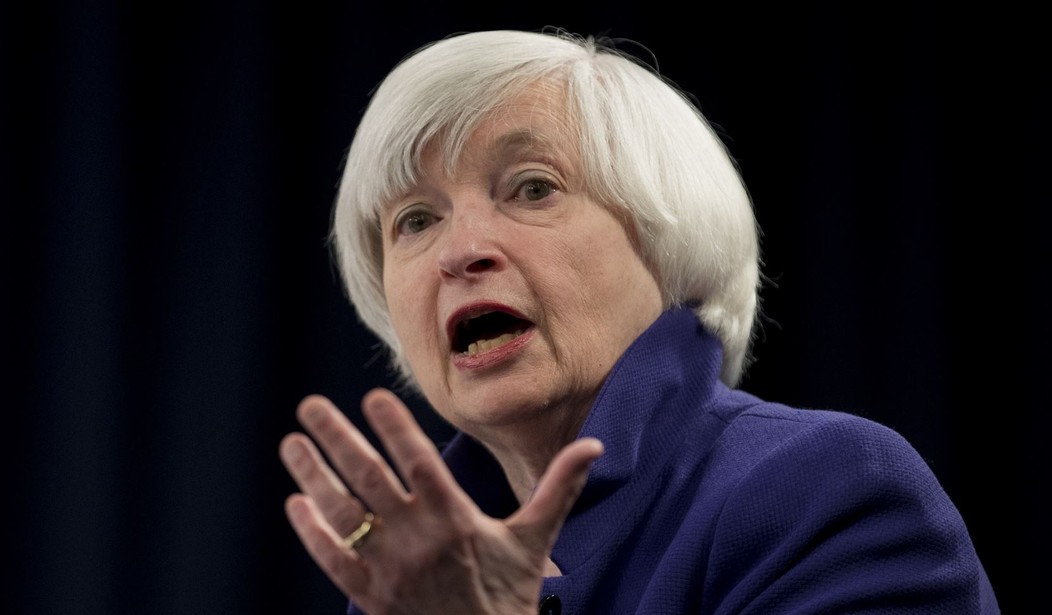Not long ago, Treasury Secretary Janet Yellen insisted that inflation was “transitory.”
For instance, in May, Yellen said, “My judgment right now is that the recent inflation that we have seen will be temporary. It’s not something that’s endemic.”
In June, she doubled-down, saying, “We have in recent months seen some inflation … But I personally believe that this represents transitory factors.”
Then, in July, Yellen stated, “I think over the medium term, we’ll see inflation decline back to a normal level.”
That was then, this is now.
On October 24, while appearing on CNN’s State of the Union, Yellen abruptly changed her tune on “transitory” inflation.
According to Yellen, “On a 12-month basis, the inflation rate will remain high into next year because of what’s already happened. But I expect improvement ... by the middle to end of next year, second half of next year.”
She added, “I don't think we're about to lose control of inflation. … It's something that's obviously a concern … but we haven't lost control.”
Despite Yellen’s contention that she can “control” inflation, the opposite is true.
Inflation, like a force of nature, is uncontainable. In fact, generally speaking, inflation begets more inflation.
Think about it like this: When consumers see prices rising, they tend to buy goods in bulk, hoping to avert coughing up more money for the same goods when prices increase more down the road. The result of this consumer phenomenon is simple: it decreases the supply of goods, while demand remains constant, increasing the price of said goods.
In other words, inflation is as much about consumer psychology as it is about economics.
Recommended
However, that is not to say that fundamental economics do not play a vital role in inflation. And, judging by the economic underpinnings of the U.S. economy, inflation is far from transitory.
For the past 18 months, the U.S. economy has been operating at suboptimal levels due to the COVID-19 pandemic. The effects of this are many-fold.
The unprecedented shutdowns have caused massive disruptions to the U.S. (and global) economy. As workers languished at home, the production of goods and availability of services suffered accordingly, creating mass shortages and price spikes.
It will take years, not weeks or months, for the global supply chain to recover, ensuring that inflation is a long-term problem.
Making matters worse, the U.S. government has embarked on an unparalleled money printing spree, with the hopes of pouring dollars into the system to avoid near-term pain.
To date, the federal government has showered the economy with $4.7 trillion in so-called COVID-19 relief funds.
All that money printing comes at a steep price. When the Federal Reserve and U.S. Treasury pump trillions of dollars into an economy that is unable to produce goods and services at normal levels due to government shutdowns, you have more dollars chasing fewer goods and services.
This results in higher prices, hence, more inflation.
Janet Yellen, undoubtedly, is well-versed in the ins and outs of inflation. She served as chair of the Federal Reserve Board from 2014 to 2018.
Yet, for months she (and others, including current chair of the Federal Reserve Jerome Powell) repeatedly claimed that inflation would be “transitory.” She also consistently claimed inflation would not rise above 3 percent. It currently hovers above 5 percent, with no sign of abating.
It would have behooved Yellen and others to come clean about inflation, instead of pretending it was a temporary problem that would magically disappear on its own volition.
Janet Yellen has degrees in economics from the Ivy League, but she lacks common sense. Perhaps decades in government and academia spouting economic theory has blinded her from the harsh reality that inflation inflicts upon those who are most harmed by it: the poor.
Most Americans, on the other hand, do not possess economic degrees from such institutions, but they surely see what is actually occurring every time they go to the grocery store and gas station.
Janet Yellen and her out-of-touch colleagues want you to think inflation is just a temporary blip, but even they know that is too much of a whopper for the American people to buy at this point.
Unfortunately, as Yellen has finally admitted, inflation is here and it is not going away anytime soon.
Chris Talgo(ctalgo@heartland.org)is senior editor at The Heartland Institute.
























Join the conversation as a VIP Member